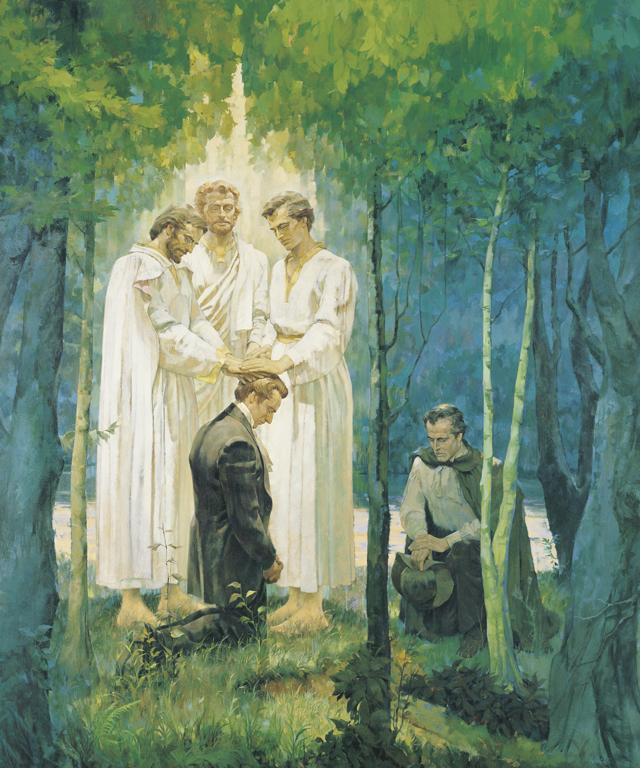I think within the "traditional" Christianity there is a general consensus that the words from Matthew 16:18,
speak of the continuity of the Church - she will never cease to exist. As far as I'm aware, Joseph Smith's Translation did not change this passage in any way. I've seen quite a lot of articles in which this verse is used in opposition to the LDS teaching on the (very need and possibility of the) Restoration. How does the LDS Church view this passage and what's the response of Mormon apologetics to the critique based on it?
Regards

Hi, LoTrobador. I read one explanation that made a lot of sense to me. It addressed the topic from a first-century Judeo-Christian perspective, which is what I think we need to do in order to properly understand what Christ was saying. Most Christians today believe the gates of Hell to have been a symbolic reference to the forces of evil, and that Jesus was saying, Nothing, no evil power, not Satan or his followers will ever destroy my Church. Thats not what he was saying at all, and thats not how Peter and the other Apostles would have interpreted His remarks. To a first-century Jew, the gates of Hell would have had no such sinister connotations. It would have meant nothing more than the entrance to hades, or the world of the dead. Jesus Christ preached to the spirits of the dead during the three days His body lay in the tomb after His crucifixion. Those who had lived and died without hearing His gospel were given the opportunity to do so even after their deaths. Many accepted the truths they were taught and, as a result, were recipients of His grace. His gospel continues to be taught in the Spirit World today. Hence, the gates of Hell never have and never will prevail against His Church. Not even death will prevent the pure in heart from hearing and receiving the gospel.
Jesus was not saying that the institutional Church He established would always continue to teach the fulness of His gospel. It
was prophesied that the early Church would fall into apostasy. Throughout the New Testament, the Apostles warned that this was to happen. Paul seemed particularly concerned about it. Among his statements to Christ's followers, are these:
Acts 20:29 For I know this, that after my departing shall grievous wolves enter in among you, not sparing the flock.
2 Thessalonians 2:3 Let no man deceive you by any means: for that day shall not come, except there come a falling away first, and that man of sin be revealed, the son of perdition
Galatians 1:6 I marvel that ye are so soon removed from him that called you into the grace of Christ unto another gospel
2 Timothy 4:3 For the time will come when they will not endure sound doctrine; but after their own lusts shall they heap to themselves teachers, having itching ears
Paul made it absolutely clear that (1)the flock would not only be attacked, it would not be spared, (2) Christ would not return to the earth until this universal "falling away" or "apostasy" had taken place, (3) these things were already beginning to take place as he spoke, and (4) the doctrines taught by the Savior would, in time, cease to endure.
The Apostles also spoke of a restoration of that which had been lost. As recorded in Acts 3:19-21, Peter prophesied of this restitution or apokatastasis (also translated as reconstitution, restoration or re-establishment) "when the times of refreshing shall come from the presence of the Lord; And he shall send Jesus Christ, which before was preached unto you: Whom the heaven must receive until the times of restitution of all things, which God hath spoken by the mouth of all his holy prophets since the world began.
He did not specifically state when it would take place. However, he did say that Christ will not return until the restitution of all things had occurred. In other words, the second coming will take place after all things have been restored. The two events will not take place simultaneously. The Greek word for until, as used in this instance, is achri. It denotes completion of an act or event as in the statement, You cant go to the movies until youve cleaned your room. Other examples of this usage are found in Luke 1:20, Romans 8:22 and Revelation 17:17.
In Revelation 14:6, John too spoke of the Restoration, when he described seeing "another angel fly in the midst of heaven, having the everlasting gospel to preach unto them that dwell on the earth, and to every nation, and kindred, and tongue, and people
"
What reason could there be for an angel to have to bring the gospel to earth if it had never been taken away?

